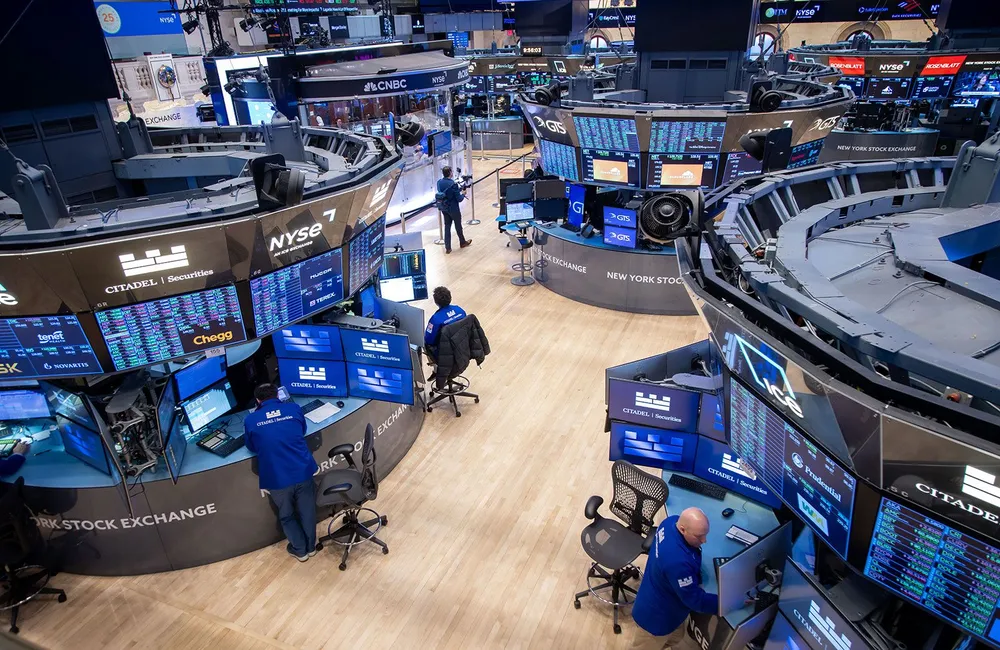The Australian SPI 200 futures contract dropped 35 points at 7304 at 8.00 am AEST, indicating a negative start to trading.
Technology stocks recovered sharply on Monday as government bond yields continued to climb, signaling that investors believe the Federal Reserve isn’t finished moving quickly in raising interest rates.
The tech-focused Nasdaq Composite ended the day up less than 0.1%. It declined as much as 2.7 percent earlier on Monday before paring losses in the afternoon. Last week, the benchmark logged its largest one-week percentage drop since February, as climbing bond yields poked a hole in tech valuations.
The S&P 500 also trimmed losses during Monday trading, finishing down about 0.1%. It marked the fifth straight day of losses for the benchmark. The Dow Jones Industrial Average dropped 0.45%, or more than 164 points.
The S&P/ASX 200 closed essentially unchanged, down 0.1% to 7447.1. Incitec Pivot, which makes explosives and chemicals, closed up 2.1% after it said it had reached a deal, worth roughly A$142 million, to buy Explinvest, the holding company of a France-based explosives manufacturer, Titanobel.
Improving battery technology company Novonix was another of the session’s big winners, as it began the process of listing its securities on the Nasdaq, ending nearly 11% higher.
Plumbing supplies company Reliance Worldwide and real-estate developer Lifestyle Communities suffered the biggest losses, both closing down 3.4%.
International Stock Markets
International stock markets were mixed. The Stoxx Europe 600 was off 1.5 percent, dragged down by shares of real estate and tech companies. The Shanghai Composite Index gained 0.4% in Asia, while Hong Kong’s Hang Seng advanced 1.1%. Japanese markets were shut for a public holiday.
Commodities
In commodities, gold futures added 0.2% to $US 1800. 70 a barrel; Brent crude fell 1.1% to $US80. 88 a barrel; Iron ore down 1.5% to US$125.45 a tonne.
Intermingled with this has been a selloff in bond markets on rate hike expectations that saw the yield on the Australian 10-year bond push up to 1.91%. The US 10-year Treasury hit a day high above 1.8% in intra-day trade but closed at 1.76%.
The Aussie was fetching 71.64 US cents around 8. Down from 71.77 at the previous close, at 6.00am AEST. The WSJ Dollar Index, which tracks the US dollar against 16 other currencies, slipped to 89.86.
Asia
Chinese shares ended broadly higher, boosted by gains in energy stocks. The Shanghai Composite Index finished 0.4% on the positive side, the Shenzhen Composite Index advanced 0.6%, and the ChiNext Price Index lost 1.19 points. Energy stocks were some of the best performers as resilient demand helped to compensate for coronavirus-related worries. Yankuang Energy ended up 2.2%, China Coal Energy gained 3.3% and PetroChina rose 0.6%. Chinese property stocks should stay in focus, after reports that all residential and commercial projects owned by the defaulters are for sale.
Hong Kong stocks closed higher, continuing a winning streak that began late last week. The benchmark Hang Seng Index climbed 1.1%. Online healthcare providers and drug makers topped the list of gainers as the sector continued to climb on hopes of strong demand for Covid-19 treatment after the latest wave of infections in China. Alibaba Health soared 11% and CSPC Pharmaceutical rose 6.2%. Chinese tech stocks also rose, resuming a rally that followed last week’s selloff. Kuaishou jumped 10% and Tencent added 2.3%.
Japanese markets were shut for a public holiday.
Europe
European stocks add to earlier losses as investors get jitterier about rising US interest rates. The pan-European Stoxx Europe 600 dropped 1.5%.
“Last week’s selling tour of all US stocks continued today, as investors took another look at the prospect of US hikes in the months ahead” IG analyst Chris Beauchamp says. “Last week’s shockwaves from the Fed minutes have yet to fully subside, and as policymakers continue to hammer the more hawkish outlook, it seems investors have completely lost their taste for stocks at least for now.”
In London, the FTSE 100 ended 0.5% higher on support from banking and mining stocks. Miners Anglo American and BHP Group climbed as metal prices rose. London’s blue-chip index looks to be holding up slightly better than the rest of the pack, aided by financials and consumer staples outperformance, says Michael Hewson at CMC Markets.
North America
Technology stocks recovered from sharp losses on Monday as government bond yields continued to rise, a sign that investors anticipate the Federal Reserve will soon move to raise interest rates.
The tech-rich Nasdaq Composite finished with a gain of less than 0.1%. It declined as much as 2.7 percent earlier Monday before trimming losses in the afternoon. The benchmark notched its largest one-week percentage drop since February last week, as higher bond yields pricked tech valuations.
The S&P 500 also narrowed losses during Monday trading, closing down about 0.1%. It was the benchmark’s fifth straight day of losses. The Dow Jones Industrial Average lost 0.45%, or over 164 points.
Parent Meta Platforms fell over 1% on Facebook. Apple, Nvidia and Microsoft each turned losses into gains by the end of the day.
The early tech declines followed a climb in yield on 10-year Treasury notes to 1.779% -- its highest closing level since January 2020, according to Tradeweb -- from 1.769% on Friday. The benchmark yield touched 1.807% at one point before pulling back. Bond yields rise as prices fall, and vice versa.
Soaring yields have triggered a tremor in tech stocks since the beginning of 2022. By selling bonds and pushing yields up, investors are signaling that they anticipate the Fed raising short-term interest rates in March and beginning to reduce its holdings of bonds and other assets soon after.
Low rates have fueled an enormous rally in tech stocks last year, rendering bonds less attractive and encouraging investors to buy riskier assets. But as the Fed has turned its attention to combating inflation, tech stocks have lost some of their shine. The possibility of higher rates also takes the shine off what investors perceive to be the future cash flows of fast-growing tech companies, denting their share prices.
“Clearly tech was due for a correction,” said Eric Mintz, co-portfolio manager at Eagle Asset Management. “So this correction has seen valuations come down to a much more sensible level.”
US inflation data due on Wednesday will be closely scrutinised as investors try to gauge when the Fed might start lifting borrowing costs. Monthly consumer prices are projected to have increased by more than 7 percent compared with a year earlier for the first time since 1982.
Futures markets now imply over a 75% chance of the Fed raising rates at its March meeting, data from exchange operator CME Group shows.
Investors are also looking ahead to the corporate earnings season, which begins this week with results from American financial firms like JPMorgan Chase, Citigroup, Wells Fargo and BlackRock. A lot of investors had been pouring money into bank stocks, betting they would benefit from higher interest rates.
One of them is Hani Redha, a multi asset fund manager at PineBridge Investments. The New York-based investment firm has reduced its holdings of tech stocks and Treasuries and increased cash holdings and exposure to financial companies, he said.
“A lot of equities are down and bonds are down too,” Mr. Redha said. “For now, even cash is better than holding risk assets.”
In recent weeks, the fast-spreading Omicron variant of Covid-19 has also rattled markets. The number of new coronavirus cases reported in the United States during an average week surged past 700,000 for the first time over the weekend, according to data compiled by Johns Hopkins University. Even though evidence indicates that Omicron is relatively mild, the increasing caseload has led to staffing shortages at airlines, retailers, factories and other companies.
Lululemon said on Monday that its fourth-quarter earnings would be at the lower end of forecasts after staff shortages and capacity issues linked to Omicron dented sales during the holiday-shopping season. The news of the apparel maker’s shares tumbled 2.2%.
In other corporate developments, shares of Take-Two Interactive dropped 13% after the video game maker agreed to acquire Zynga in an $11 billion agreement. Zynga shares soared 41%.
The shares of GameStop, a darling of individual investors, fell 6.7 percent, having surged last week on news that the video game retailer intends to enter the non fungible tokens and cryptocurrency markets.
Bitcoin fell briefly to below $40,000 for the first time since September. It was recently changing hands around $41,500, per CoinDesk, 2% lower than its price at 5pm New York on Sunday.





















